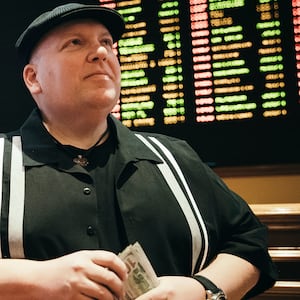A pair of ballot measures that would legalize sports gambling in California could prove to be the nascent industry’s first bad bet, amounting to lighting nearly half a billion dollars on fire.
Despite mobile sports betting becoming legal in more than half the states in the country following a 2018 Supreme Court decision, no victory for the big money sportsbook apps would be greater than operating in California.
Between the online gambling companies, tribal casino operators, and other entities involved, total spending on the pair of referendums has already surpassed $400 million, making it the most expensive ballot referendum in U.S. history.
It also led to a fissure among Native American tribes faced with the difficult choice of sticking together and risk being left out of the windfall or collaborating with the big money sportsbooks to go all-in on mobile.
The industry-backed referendum, Proposition 27—officially titled the “California Solutions to Homelessness and Mental Health Support Act”—would legalize sports betting on mobile devices.
Since California would be the world’s fifth largest economy if it were a country, it has become the final frontier for mobile sportsbooks in North America, with legal status already secured to varying degrees across Canada and in 15 states that allow mobile sports betting across the board. Thirty-two states, in addition to the District of Columbia, have legalized sports betting in some form, with only six of them restricting it to retail casinos.
That’s where the other California ballot referendum comes in. Proposition 26 would only allow for sports betting in-person, and only tribal casinos and horse racing tracks could take the bets. It’s a more old school approach, requiring more effort from consumers to make a plan to go visit a casino instead of just pulling out their phones mid-game.
The ballot referendum process has also fractured the Native American gambling lobby and led to confusion in attack ads.
The majority of Native American casino operators support Prop 26, with a coalition of more than 30 tribes behind the measure. However, three tribes—The Santa Rosa Rancheria Tachi Yokut Tribe, along with the Middletown Rancheria of Pomo Indians and Big Valley Band of Pomo Indians—opted to join the likes of Fanduel and DraftKings in supporting Prop 27.
If both measures passed, they could theoretically operate legally alongside each other barring a court challenge. Under the California constitution, whichever provision wins the most votes gets to stay in place if the other is deemed to interfere with the newly legalized business.
To avoid that outcome, both factions have launched a barrage of ads targeting the side. But, so far, that approach has backfired and resulted in voter opposition to both measures.
“I think it’s the negative advertisements that have kind of been turning voters away,” Mark DiCamillo, the director of The University at California Berkeley’s poll on both ballot questions, told the Los Angeles Times. “People who haven’t seen the ads are about evenly divided, but people who’ve seen a lot of ads are against it. So, the advertising is not helping.”
Prop 26, the retail-only version, only received 31 percent support in Berkeley’s pool of likely voters, with 42 percent opposed.
Prop 27, which has significantly more money behind it, performed even more poorly with just 27 percent support and 53 percent opposed.
An earlier poll in September from the Public Policy Institute of California found a similarly dismal showing for both.
While the tribal casino operators have billed Prop 26 as helping indigenous communities and dedicated 10 percent of the revenue for gambling addiction services, Prop 27 has been sold by the sportsbooks and local proponents as part of the solution to homelessness.
“By creating a safe and age-restricted online sports betting market, California can capture hundreds of millions of dollars in revenue and use it to help solve one of our greatest challenges,” Jamie Almanza, CEO of Bay Area Community Services, said in a statement endorsing the mobile sports betting version the “Yes to Prop 27” campaign website. “This funding will be used to build housing and help provide mental health treatment to our neighbors in need.”
The organization subsequently pulled its support from the mobile sports betting initiative. A spokesperson for Bay Area Community Services informed The Daily Beast on Monday that "we have now, upon a deeper review and with consultation with our board of directors, moved to take an officially neutral stance."
Jose “Moke” Simon, chairman of the Middletown Rancheria of Pomo Indians, also argued that Prop 27, despite not having the support of most tribal casino operators, “protects Tribal sovereignty and will allow every Tribe—not just those with big casinos close to big cities—a chance to directly benefit from online sports betting in California.”
Representatives for both ballot measures did not return requests for comment.
Despite the lofty messaging, the saturation of ads has contributed to a sense of suspicion over the big money interests behind legalizing sports betting in California, according to Thad Kousser, a political science professor at the University of California San Diego.
Kousser described the industry as “trying to spend their way out of a political hole” in an interview with the LA Times.
“They start saying this is about some wealthy interests trying to buy this election,” Kousser said of Golden State voters. “Anytime you spend massive amounts, it triggers that instinct in voters.”







